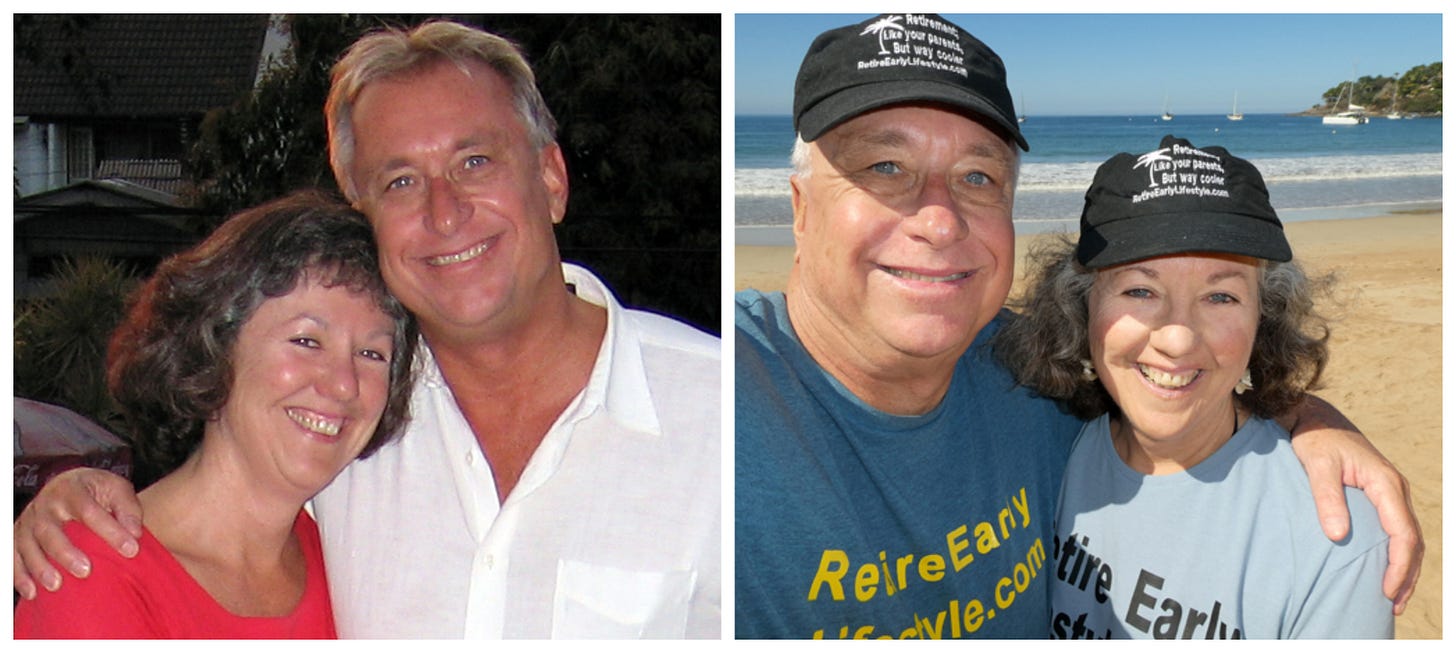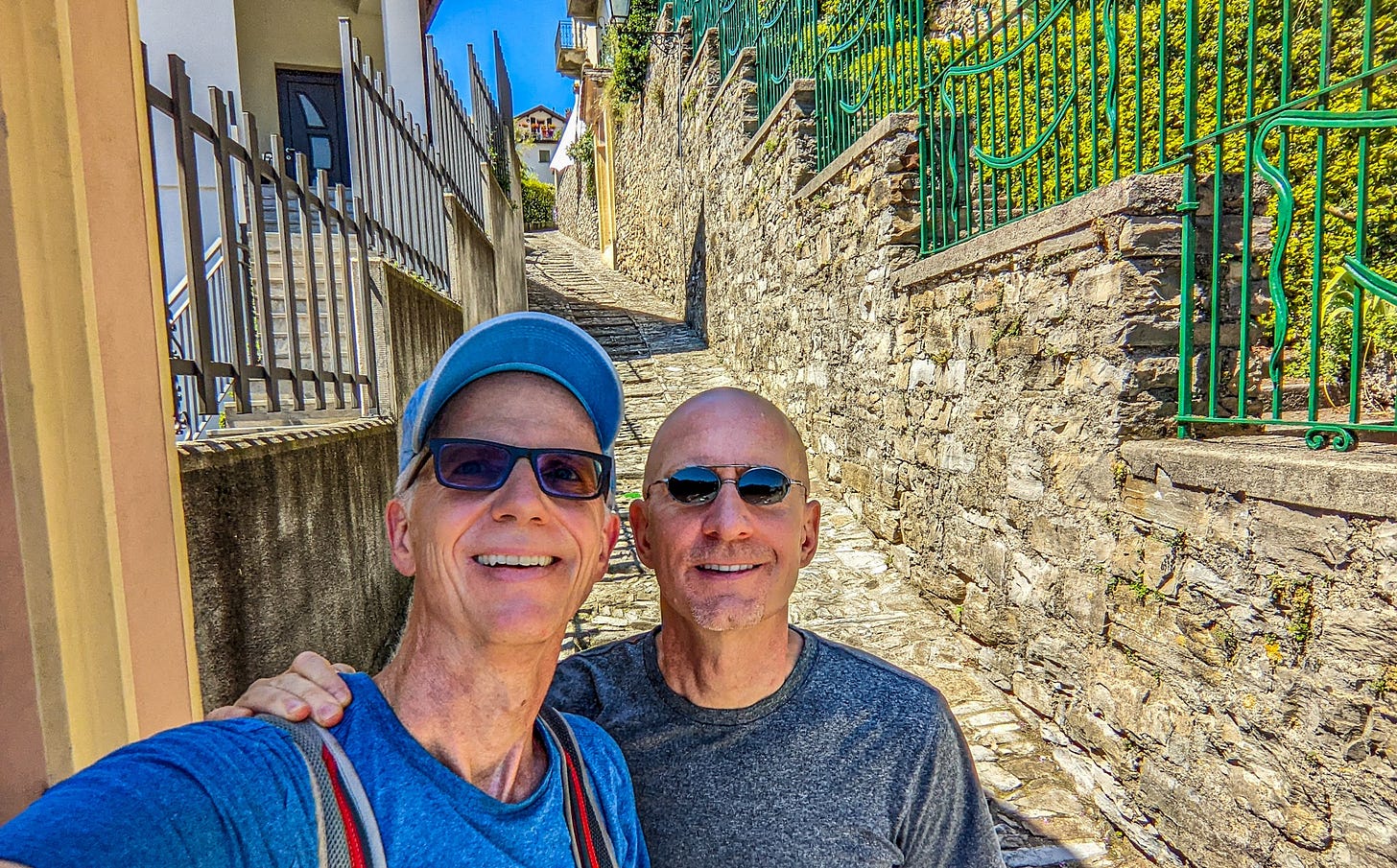|
Retire Early
Lifestyle
Retirement; like your parents, but way cooler
|
In 1991 Billy and Akaisha Kaderli retired at the age
of 38. Now, into their 4th decade of this
financially independent lifestyle, they invite you
to take advantage of their wisdom and experience. |
|
Is Life Really Better After FIRE?
Brent Hartinger
Financial independence and early retirement are all the rage.
But is that life truly as good as they say?
I won’t leave you in suspense: yes, life is better after FIRE.
FIRE stands for Financial Independence/Retire Early, and it’s the name for the
lifestyle movement that encourages people to spend much less and save more
aggressively so they can — duh! — retire early.
And to hear people on FIRE tell it, life really is better post-early-retirement
— usually, way better.
“It’s freedom,” says Amy Rutherford, who retired with her husband Tim Rutherford
in their 40s in 2015; they now run GoWithLess, a
YouTube
channel and a
Facebook group devoted to their experiences. “We have the freedom to do whatever we want
whenever we want. We spend lots of time with friends, going on nice holidays.
Cooking. At no moment have we been bored. We’ve been relaxed but not bored.”
Akaisha Kaderli and her husband Billy retired in 1991 in their 30s — long before
FIRE was a movement with a catchy acronym. She too says the experience has been
overwhelmingly positive — so much so that they’ve
co-written books
on their experiences.
“We wanted an international lifestyle with bohemian friends and viewpoints,”
Kaderli says. “We’ve traveled the world, eaten local cuisines, climbed
volcanoes, scuba-dived, and done white water rafting. Geography and history have
come alive in real time and become three-dimensional for us.”

Akaisha and Billy Kaderli, then and now.
Michael and I also began practicing FIRE before it was a “movement” per se.
Because we’ve been self-employed writers for most of the last twenty years, our
income was very inconsistent. As a result, we tried hard to spend less than we
earned and save aggressively for leaner years.
As nomads for the past five years,
we spend so much less than we did living back
in the United States that we’re now essentially quasi-retired — only working on
projects we choose.
And
we haven't exactly
been shy about
how much better our
own lives are.
But come on: nothing in life is perfect. And whatever else is true about FIRE,
there’s also currently a ton of hype.
So what’s the God’s honest truth? What are the challenges that come even after
you’ve set yourself on FIRE?
Show Me the Money
The truth is, if you’ve been in the stock market, it’s been fairly easy to make
big returns over the last thirteen years: it was a bull market from 2009 to
2020, and then after a brief, covid-related downturn, the market shot up again.
Ditto for real estate. In most places, housing prices have gone up dramatically.
And if you managed to purchase a home from 2008 to 2010, after the burst of the
previous housing bubble, you stumbled into an even greater buying opportunity.
It’s probably not entirely coincidental that the rise of the FIRE movement has
coincided with these boom-times for Americans in the middle and upper-class.
But what happens if the economy enters an extended downturn — or even simply
stagnates? Are people currently on FIRE prepared?
“It’s very easy to oversimplify, disregard, and delude ourselves into justifying
anything we want to buy,” says psychologist
Scott Guerin, who retired last year
at age 63. “We humans do this all the time. But retirement is not the time to
gloss over the details and spend unchecked. Do you have the resources to survive
a down market and a war or two?”
Indeed, whatever age you retire, you’re essentially deciding you have most or
all of the money you’ll need to live on for the rest of your life. The younger a
person retires, the riskier that decision is: forty or fifty years is a long
time to comfortably predict into the future. If you do have to go back to work,
will you be subjected to ageism, or will your hard-won skills be out-of-date?
That said, it’s definitely possible to make a plan. “I’ve asked my financial
advisors a million times if I’ll have enough money,” says
Scott Guerin. “They
always told me that, while no one has a crystal ball, decades of history and
their team of over 100 analysts say that if we keep to our annual budgets, we'll
be fine."
Plus, FIRE doesn’t necessarily mean no work or income; it just means being able
to be more choosy about the work you do.
“Most people get hung up on the ‘retire early’ part of FIRE,” says Lauren Keys,
who retired at 29 and also keeps a
blog of her and her husband's FIRE experience. “They think they'll get bored if they don't work, or they think that
they aren't allowed to earn any more money once they're retired. The truth is,
financial independence just gives you more options and the freedom to choose
what you want to do.”
The Art of Letting Go
For some, the transition to a life on FIRE is easy.
“I thought it might take a while to extricate myself from my old life,” says
Amy Connors
Rutherford. “It was such a big part of who I was, I thought I’d never been able
to leave it behind. But three days, and it was done. Evaporated.”
On the other hand, she admits that the lack of structure in her life now can
sometimes be a problem. “My husband and I need a routine, but we have a hard
time sticking to one on our own. We’re not always disciplined enough to do
healthy things like go to the gym.”

Amy Rutherford and her husband Tim
For others, retiring early can mean leaving behind important workplace
relationships — and also all the structure and identity that comes from your
job.
“I experienced some depression for a few weeks,” admits Scott Guerin, who now
writes about spirituality. “It takes time to decompress. It’s been an emotional
journey.” He’s also had to make it a priority to find and maintain friendships.
“Those of us who are introverts, we have to up our game. For many of us, it
requires effort.”
Some early retirees also find themselves a bit isolated from their peers.
“I don’t have any friends who can relate,” says
G. Wilson, who retired at 42.
“It's a lonely success story. No one throws you a retirement party when you
retire early.”
“It’s great having all your time to yourself and not taking bulls**t from other
people,” agrees John Frigo, who is currently working on a book about the FIRE
Lifestyle for Millennials and Zoomers. “The downside for me was that my
girlfriend didn’t really want to FIRE, and most of my friends still had jobs.”
In the end, Frigo chose to
continue working, but on his own terms. “I basically
have my ‘f**k you’ money, and if my workplace ever gets on my wrong side, I can
say, ‘Peace,’ and walk out on the spot. It makes working a thousand times better
knowing I don’t have to be there.”
FIRE gets all the attention, but the fact is, “slow
FIRE” — where people are
“retired-ish” — is extremely common.
This is the option Michael and I have chosen. And why not? The whole point of
FIRE is to enjoy life — to not be a slave to your job. But if you’re a slave to
someone else’s conception of FIRE, is that really any better?
“Wasting Your Life”?
The most difficult part of FIRE isn’t always the emotional adjustment or even
stress over one’s finances.
For many, it’s been the judgment of friends, family, and the world at large.
The FIRE movement sits at the nexus of a lot of issues that have been even more
fraught lately than usual: money, privilege, travel, generational conflict,
capitalism, and the American/Protestant work ethic.
With a
YouTube channel, Amy Rutherford is often literally one face of FIRE. As
such, people online can be very pointed about the choices she and her husband
have made.
“Stop with the judgement!” she says, exasperated. “I worked for decades, I
helped raise my husband’s three kids, who are now my kids. I’ve been
volunteering my entire life, and I’m still volunteering. We make lots of
charitable contributions. I’ve done the work to earn some free time without
judgment. I deserve my nap, my free time.”
Akaisha Kaderli says that FIRE has made her a
more productive citizen — not that
it’s anyone else’s business how she and her husband choose to live their lives.
They’ve done all kinds of volunteer work, from teaching English to children,
coaching basketball, building tennis courts, and working with indigenous
populations.
“FIRE is not a continuous round of golf or margaritas on the beach,” she says.
“At some point, you will want your life here on earth to have mattered, whether
you volunteer or follow your spiritual path or artistic dreams.”
Meanwhile, G. Wilson chose FIRE because his own father wasn’t very engaged in
his life when he was a child, and he wanted to be more available for his own
kids. After retiring last year, he and his wife are now both stay-at-home
parents.
“There’s no recipe for what I’m doing,” he says. “I started a blog,
DadisFire to
try to capture my thoughts on it all. But I’ve been at playgrounds too much to
update it.”

Michael and me. For us, earlier retirement was an uphill — but not impossible —
climb.
FIRE is Simply a Tool
Maybe I’ve drunk too much of the FIRE Kool-Aid, but I find myself frustrated
with Some of the recent
criticisms of the movement. Sure, there’s
too much hype and over-simplification, and I’d never deny FIRE requires some degree of
privilege.
Then again, Americans have the same amount of privilege whether they’re living
on FIRE or continuing to work.
FIRE isn’t perfect, but what movement is? Humans aren’t perfect. In the end,
FIRE is simply a tool: a collection of ideas and beliefs that people can use to
gain more control over their own lives.
More importantly, I think the values of FIRE — like the values of the Simple
Living, Deep Ecology, and even the nomading movements — are much better than
values of consumerism and American conformity they’re trying to replace.
And life on FIRE? Well, that’s never going to be completely perfect either. But
if it’s better than the alternative, isn’t that still something worth knowing?
For more from
Brent, visit him at
Brent and Michael Are Going Places.

About the Authors



Retire
Early Lifestyle appeals to a different
kind of person – the person who prizes their
independence, values their time, and who doesn’t
want to mindlessly follow the crowd.
HOME
Book Store
Retire Early Lifestyle Blog
About Billy & Akaisha
Kaderli
Press
Contact
20 Questions
Preferred
Links
Retirement
Country Info
Retiree
Interviews
Commentary
REL
Videos
|